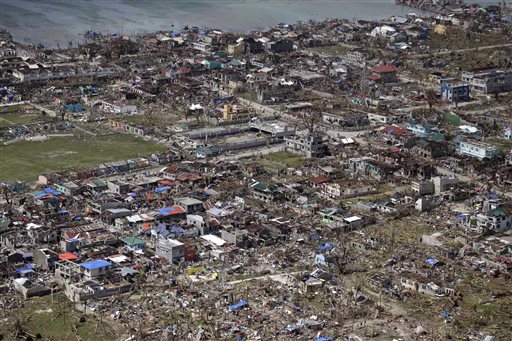
An aerial image taken from a Philippine Air Force helicopter shows the devastation of the first landfall by typhoon Yolanda (international name: Haiyan), Monday Nov. 11, 2013 in Guiuan, Eastern Samar province, Central Philippines. (AP file photo)
MANILA, Philippines — In commemoration of the 11th anniversary of Typhoon Yolanda (international name: Haiyan), President Ferdinand “Bongbong” Marcos Jr. stressed that the Philippines cannot be complacent about calamities.
His observation comes amid the country’s label as the most disaster-prone country in the world.
Based on the 2024 World Risk Report, the Philippines tops the list of countries facing hefty threats from natural disasters, followed by Indonesia, India, Colombia, and Mexico.
READ: A decade later, ‘moving on’ still hard for Yolanda survivors
“As the most disaster-prone country in the world, we cannot do otherwise. We do not have the luxury of ignorance, inaction, and complacency,” Marcos said in a statement on Friday.
He then called on the public to “mitigate and adapt to the challenges of climate change and urgently abate our vulnerability to disasters.”
“We must empower our communities and strengthen our local government units, who both comprise our first line of defense against calamities,” he said.
“We must guarantee the speedy delivery of relief and aid to all those who may need it,” the president added.
Marcos also noted that the recent onslaught of Typhoons Kristine and Leon serves as a reminder that the powerful lessons from Yolanda “should not be lost with the passage of time.”
READ: Work not yet done in helping Yolanda victims – Marcos
“Heeding these is the best way to honor the lives lost,” he said.
Yolanda, the world’s strongest typhoon ever to hit land, left 6,300 people dead, around 28,000 injured, more than a thousand missing, and over 3 million families affected.